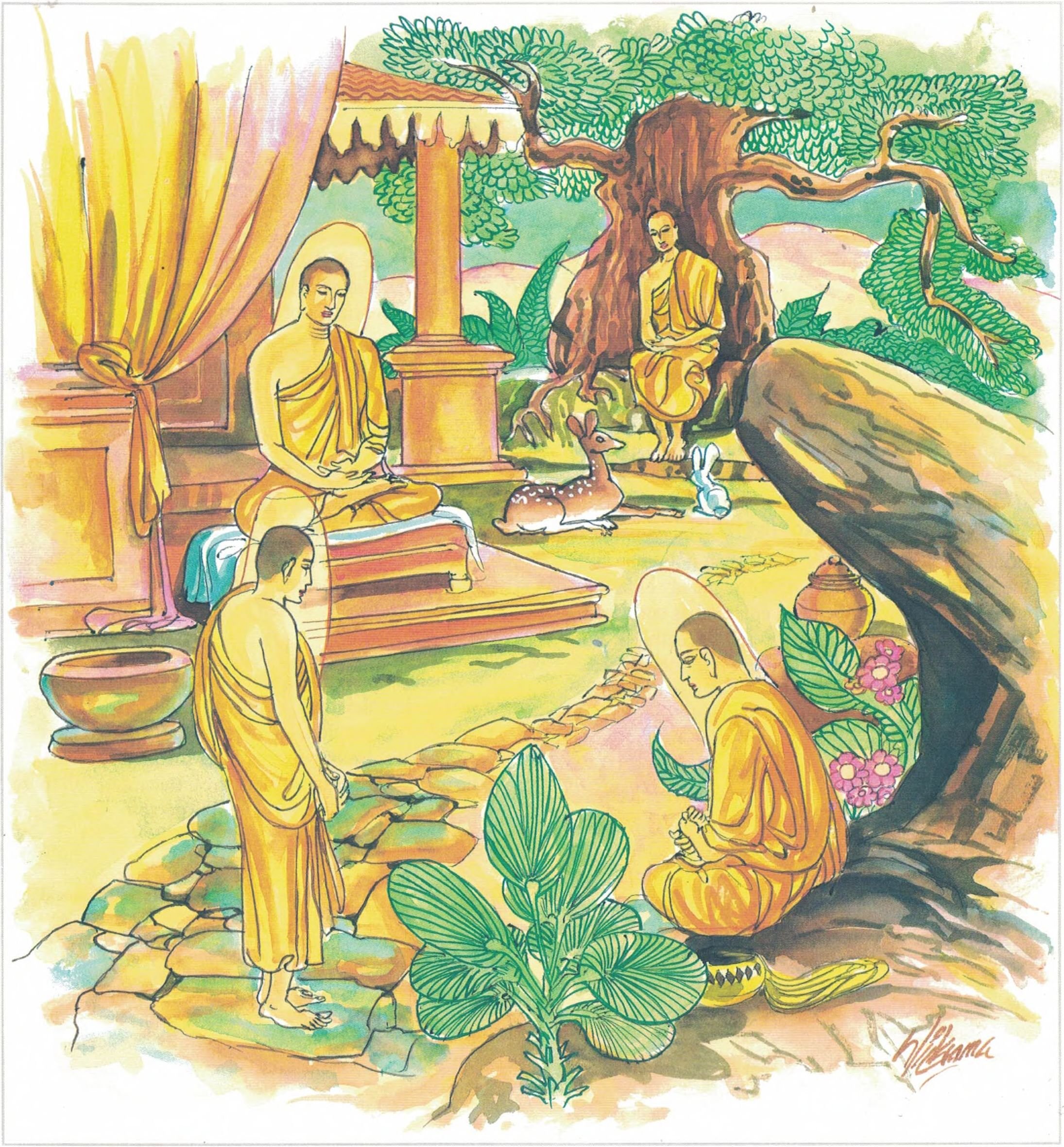Dhammapada (Illustrated)
by Ven. Weagoda Sarada Maha Thero | 1993 | 341,201 words | ISBN-10: 9810049382 | ISBN-13: 9789810049386
This page describes The Story of Venerable Revata which is verse 98 of the English translation of the Dhammapada which forms a part of the Sutta Pitaka of the Buddhist canon of literature. Presenting the fundamental basics of the Buddhist way of life, the Dhammapada is a collection of 423 stanzas. This verse 98 is part of the Arahanta Vagga (The Saints) and the moral of the story is “The abode of Arahats whether in village, valley, forest, hill or dale is indeed delightful”.
Verse 98 - The Story of Venerable Revata
Pali text, illustration and English translation of Dhammapada verse 98:
gāme vā yadi vā'raññe ninne vā yadi vā thale |
yatthārahanto viharanti taṃ bhūviṃ rāmaṇeyyakaṃ || 98 ||
98. Whether in town or woods, whether in vale, on hill. wherever dwell the Arahants so pleasing there the earth.
 The abode of Arahats whether in village, valley, forest, hill or dale is indeed delightful. |
The Story of Venerable Revata
While residing at the Jetavana Monastery, the Buddha spoke this verse, with reference to Venerable Revata of the Acacia (khadira) Forest.
Revata was the youngest brother of the Chief Disciple Sāriputta. He was the only one of the brothers and sisters of Sāriputta who had not left home for the homeless life. His parents were very anxious to get him married. Revata was only seven years old when his parents arranged a marriage for him to a young girl. At the wedding reception, he met an old lady who was one hundred and twenty years old, and he realized that all beings are subject to ageing and decay. So, he ran away from the house and went straight to a monastery, where there were thirty monks. Those monks had been requested earlier by Venerable Sāriputta to make his brother a novice monk if he should come to them. Accordingly, he was made a novice monk and Venerable Sāriputta was informed about it.
Monk Revata took a meditation topic from those monks and left for an acacia forest, thirty yojanas (leagues) away from the monastery. At the end of the vassa (rainy season), the novice monk attained arahatship. Venerable Sāriputta then asked permission from the Buddha to visit his brother, but the Buddha replied that he himself would go there. So the Buddha accompanied by Venerable Sāriputta, Venerable Sīvalī and many other monks set out to visit Sāmanera (novice) Revata.
The journey was long, the road was rough and the area was uninhabited by people;but the devas looked to all the needs of the Buddha and the monks on the way. At an interval of every yojana (league), a monastery and food were provided, and they travelled at the rate of a yojana a day. Revata, learning about the visit of the Buddha, also made arrangements to welcome him. By supernormal power he created a special monastery for the Buddha and five hundred monasteries for the other monks, and made them comfortable throughout their stay there.
On their return journey, they travelled at the same rate as before, and came to the Pubbārāma Monastery on the eastern end of Sāvatthi at the end of the month. From there, they went to the house of Visākhā, who offered them alms-food. After the meal, Visākhā asked the Buddha if the place of Revata in the acacia forest was pleasant.
Explanatory Translation (Verse 98)
gāme vā yadi araññe vā ninne vā yadī thale vā,
yattha arahato viharanti, taṃ bhūmiṃ rāmaṇeyyakaṃ
gāme vā: whether in a village; yadi: or else; araññe vā: whether in a forest; ninne vā: even in a valley; yadī: or else; thale vā: whether in a plain; yattha: in whatever place; arahato [arahata]: noble ones; viharanti: dwell; taṃ bhūmiṃ [bhūmi]: that particular place; rāmaṇeyyakaṃ [rāmaṇeyyaka]: is attractive
Whether in the village, in the forest, in a valley or in the plain, wherever arahats–noble saints–dwell, that place is alluring in the extreme.
Commentary and exegetical material (Verse 98)
arahat: the noble ones; Evolved Ones. They are also described as Ariya-Puggala (Noble Ones). Ariya-Puggala are those who have realized one of the eight stages of holiness, i.e., the four supermundane Paths (magga) and the four supermundane Fruitions (phala) of these paths.
There are four pairs:–
- the one realizing the path of stream-winning;
- the one realizing the fruition of stream-winning;
- the one realizing the path of once-return;
- the one realizing the fruition of once-return;
- the one realizing the path of non-return;
- the one realizing the fruition of non-return;
- the one realizing the path of holiness;
- the one realizing the fruition of holiness.
Summed up, there are four noble individuals: the stream-winner, the once-returner, the non-returner, the holy one. In some texts gotrabhū is listed as the ninth noble individual. According to the Abhidhamma, supermundane path, or simply path (magga), is a designation of the moment of entering into one of the four stages of holiness–Nibbāna being the object–produced by intuitional insight into the impermanency, misery and impersonality of existence, flashing forth and transforming one’s life and nature. By fruitions are meant those moments of consciousness, which follow immediately thereafter as the result of the path, and which in certain circumstances may repeat for innumerable times during life-time.
